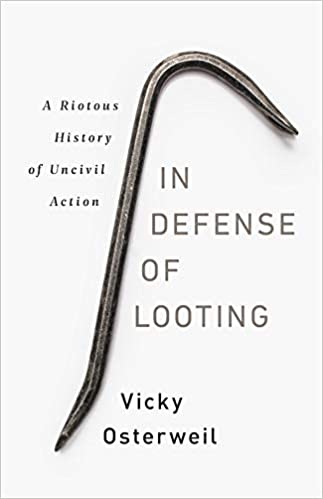NEW COLUMN is “Law And Order Unites Main Street America.” It is now on WND.COM and the Unz Review.
Excerpt:
… China might control thinking on its campuses, but can you imagine the Chinese Communist Party instructing its apparatchiks to promote material meant to make the next generation thieving, dumb and decadent? Unlikely, considering that the Chinese have a wicked work ethic, low-crime rates and that criminality is severely punished.
… the book, In Defense of Looting: A Riotous History of Uncivil Action, has become the toast of the towns not yet burned down by the putrefying left. Its author, Ms. Osterweil, a welcomed guest on many “probing” programs, presumably to explain her “provocative” “thesis” of theft.
Indeed, we inhabit a culture in which high-brow polemics are banned and banished from the public square by grubby, low-brow, social engineers, from Facebook functionaries to the once-august “Publishers Weekly”: It dubbed Osterweil’s debut a “bracing rethink” of something or another.
A new kind of Kafka confronts any author whose thoughts veer from those of the mono-cultural mainstream. Books that enlighten never see the light of day or are digitally burned by the Amazon monopoly; pamphleteers that dim debate find publishers and “respectable” reviewers.
Happily, however, Amazon reviewers were having none of the looter lady, who, mind you, merely “identifies as a woman,” which is not the same as being a woman (in my non-expert opinion). They have not reconsidered their “bracing” views about Osterweil’s immoral enterprise. These book reviews are a riot of hashtags like #violence, #steal, #stupid, #vicky, #waste:
I gave it 2 stars instead of 1 because, while it is empty headed garbage, it was a bargain since I shoplifted it.
Since Amazon doesn’t have a physical bookstore from which I can steal this book, will they please implement a virtual looting option? One star.
Sam says 1.0 out of 5 stars: “Garbage: terrible ideas and a terrible book.”
Understated, yet “Astounded” gives In Defense of Looting 1.0 out of 5 stars, writing, charitably, that it “seems rather shallow and malevolent.”
If you think these Amazon reviews are the work of Russian trolls acting for Trump, “Century Rider” provides a corrective cue: “Want another 4 years of Trump?”, writes the reviewer on August 29. “This is the kind of ‘reasoning’ that will get Trump re-elected.”
Clearly, the restoration of law and order and the reverence for private property rights are the most powerful principles with which to unite main-street America, left and right, in the ramp-up to the November election. This is what Republicans must remember, before they scamper down the judicial rabbit hole of abortion.
As to the book: Here’s the true disgrace of In Defense Of Looting: someone read the book, endorsed its publication, someone edited it, someone else set it in type, designed a cover, compiled an index, read the proofs. Now people are reviewing it.
READ THE REST. “Law And Order Unites Main Street America.” It is now on WND.COM and the Unz Review.
My website domains have been banned by Facebook. If you are on this lowbrow forum, please register your support for my work by writing a review here. One line will do. I thank you from the bottom of my heart.




